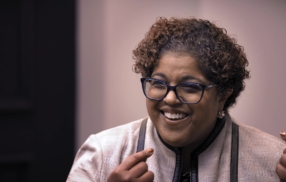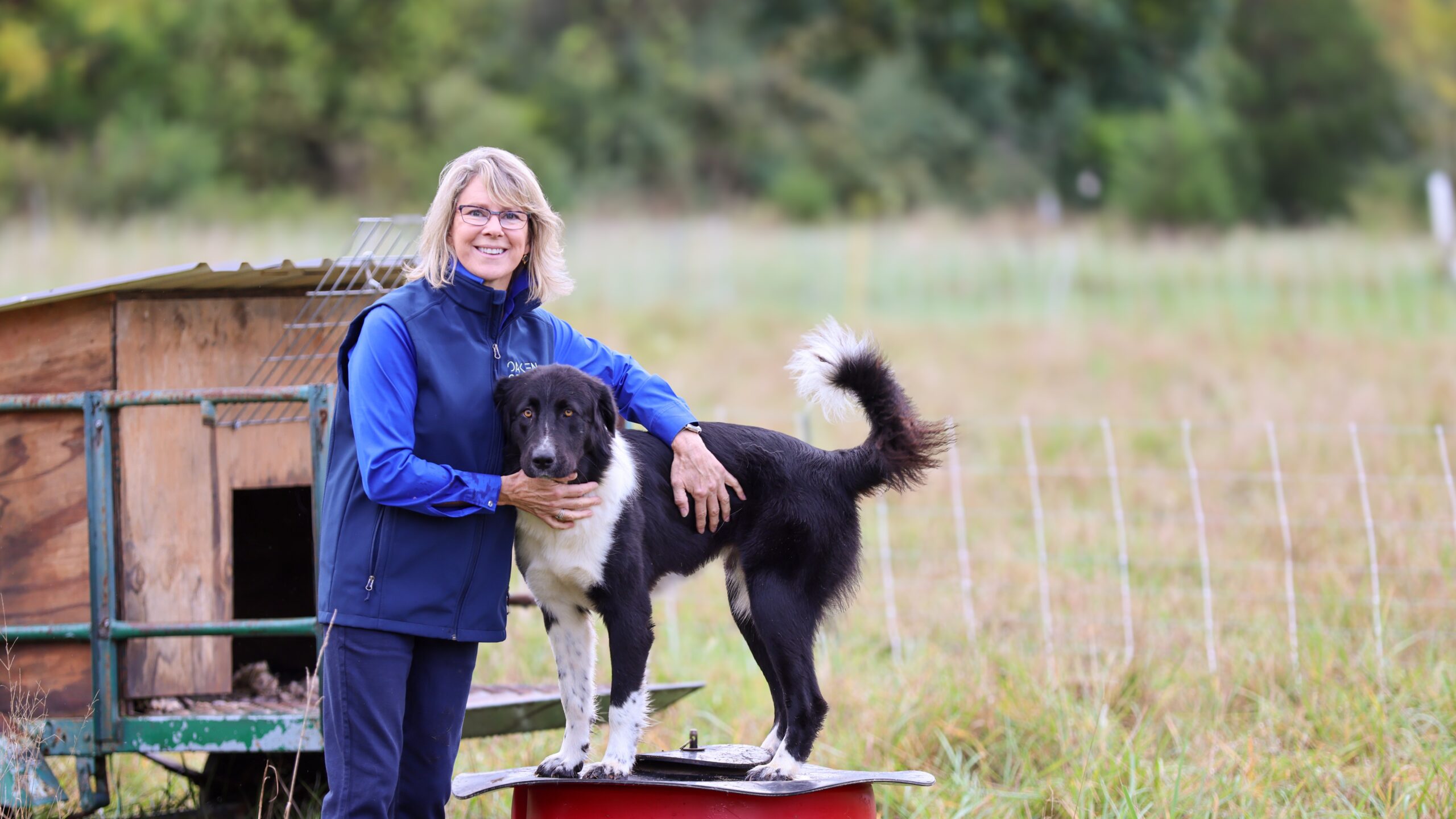
Conservation Is a Long Game. Dorothy Batten Is More Than Ready.
By Molly Mitchell
An elephant encounter confirmed the life mission of Dorothy Batten, owner of Oakencroft Farm & Winery, lifelong conservationist and Darden School of Business alumna.
Under Batten’s leadership, Oakencroft is a sustainability-first enterprise in every aspect, from land management to wine production. But the seeds for Batten’s approach were planted long before she purchased the property.
Wild Places
Batten’s deep-seated connection to the natural world started early and close to home, where she grew up as a self-described “nature child” in Norfolk, Va. “It’s my spiritual center,” she said. “I’ve just always had that very strong connection to land, to plants and animals.”
As an adult, world travel only deepened her childhood predilections. A handful of experiences in some of the wilder places of the world sparked her sense of urgency regarding conservation and steered her priorities towards preserving the natural world.
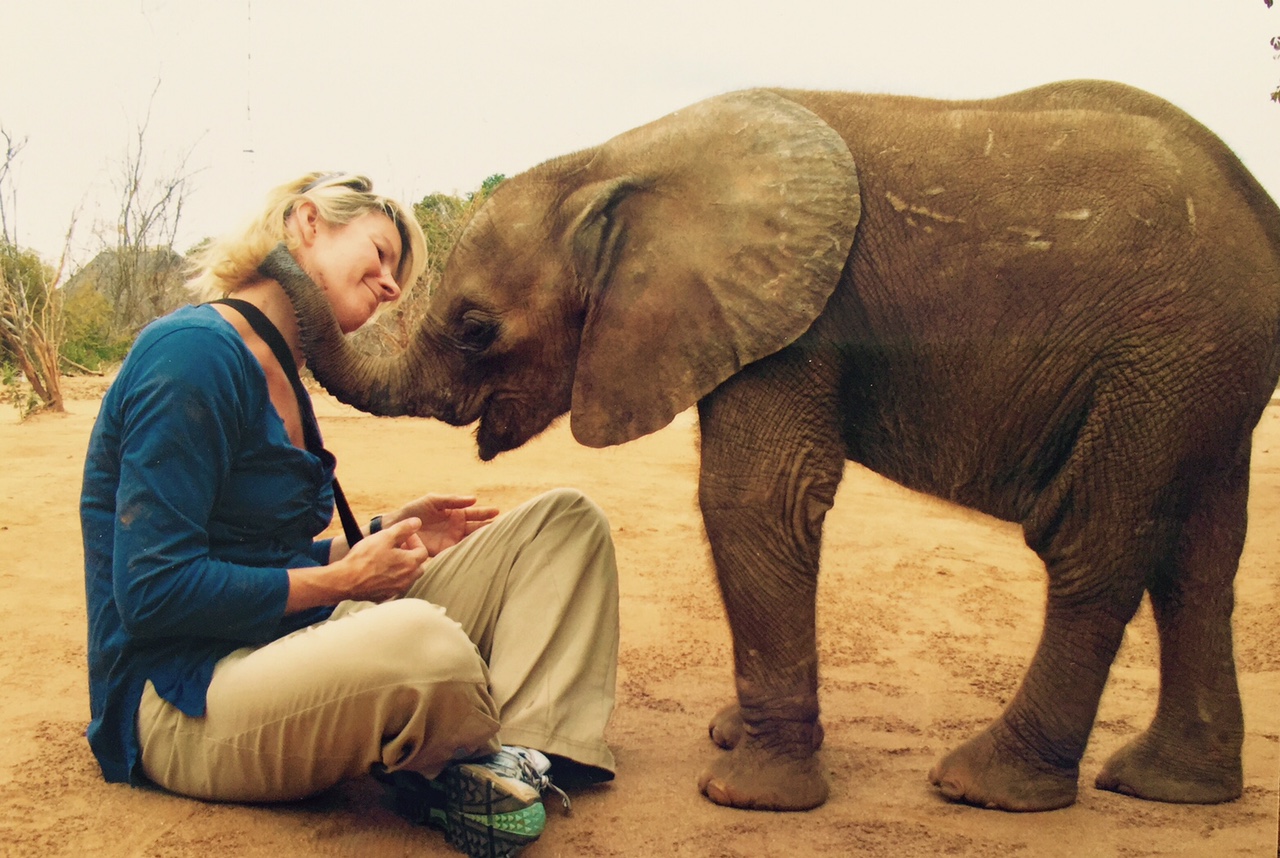
Encountering this baby elephant in Zambia helped spark Dorothy Batten’s passion for conservation.
On her first trip to Africa, a series of elephant encounters engendered a lifelong obsession. In one encounter, during travel near the Zambezi River, she interacted with a baby elephant whose mother had been poached and was being taken care of at a camp there. “I had this wild baby playing with my hair and putting his trunk in my pockets and wanting to get in my lap,” she said. “I became obsessed with elephants on that trip. And so I was like, ok, now I know why I’m here…Being in the bush where I felt so alive, I thought, ‘we can’t let this go.’”
Knowing Better, Doing Better
Before acquiring Oakencroft in 2018, Batten lived on and ran a horse farm outside Charlottesville while her kids were young. They ran the farm traditionally, which Batten views now as a mistake.
“Everything we did was wrong,” she said. “At the time, I just didn’t know. But I do now.”
In the years between the horse farm era and purchasing the Oakencroft property, Batten learned much more about sustainability through her involvement in conservation efforts. The cultural understanding of sustainability transformed in that same period, ushered to the forefront by the specter of climate change.
“I learned that conservation doesn’t have to be about setting something aside and keeping people away,” she said. “That conservation can involve people, and coexist with people still doing things in a good way.” This time, she was determined to manage the farm and winery sustainably, from soil to canopy. She wanted Oakencroft to become a true carbon sink – a place that sequesters more carbon than it emits into the atmosphere.
Batten found a kindred spirit in her farm manager, Logan Collins, and together they are finding their way forward pursuing regenerative agriculture, or farming that mutually benefits the environment and people.
From the Ground Up
Energy and soil are foundational sustainability efforts at Oakencroft, which is also a venue for conferences and events. The farm is fitted out with solar arrays, which offsets all of the energy used by the operations of the farm, winery and meeting spaces.
Batten had learned that for Oakencroft to become as biodiverse and sustainable as possible, they would have to start at the ground floor. “Our whole focus for the first few years was building the soil,” said Batten. Soil degradation from decades of spraying chemicals isn’t corrected overnight. So Batten and Collins got to work building soil health over the long term with regenerative practices like holistic animal management, cover cropping, composting, cultivating a diversity of plants and trees, and simply leaving large swaths of the farm alone.
“Part of it is letting things go and stopping what you did before,” said Batten. “Stop trying to manipulate it; work with it and say, what does it want to be? What is it supposed to be? And how can we foster that?” Rather than grooming the land by haying and bush hogging, letting the environment grow wild to some extent can encourage biodiversity and build more complex soil structure.
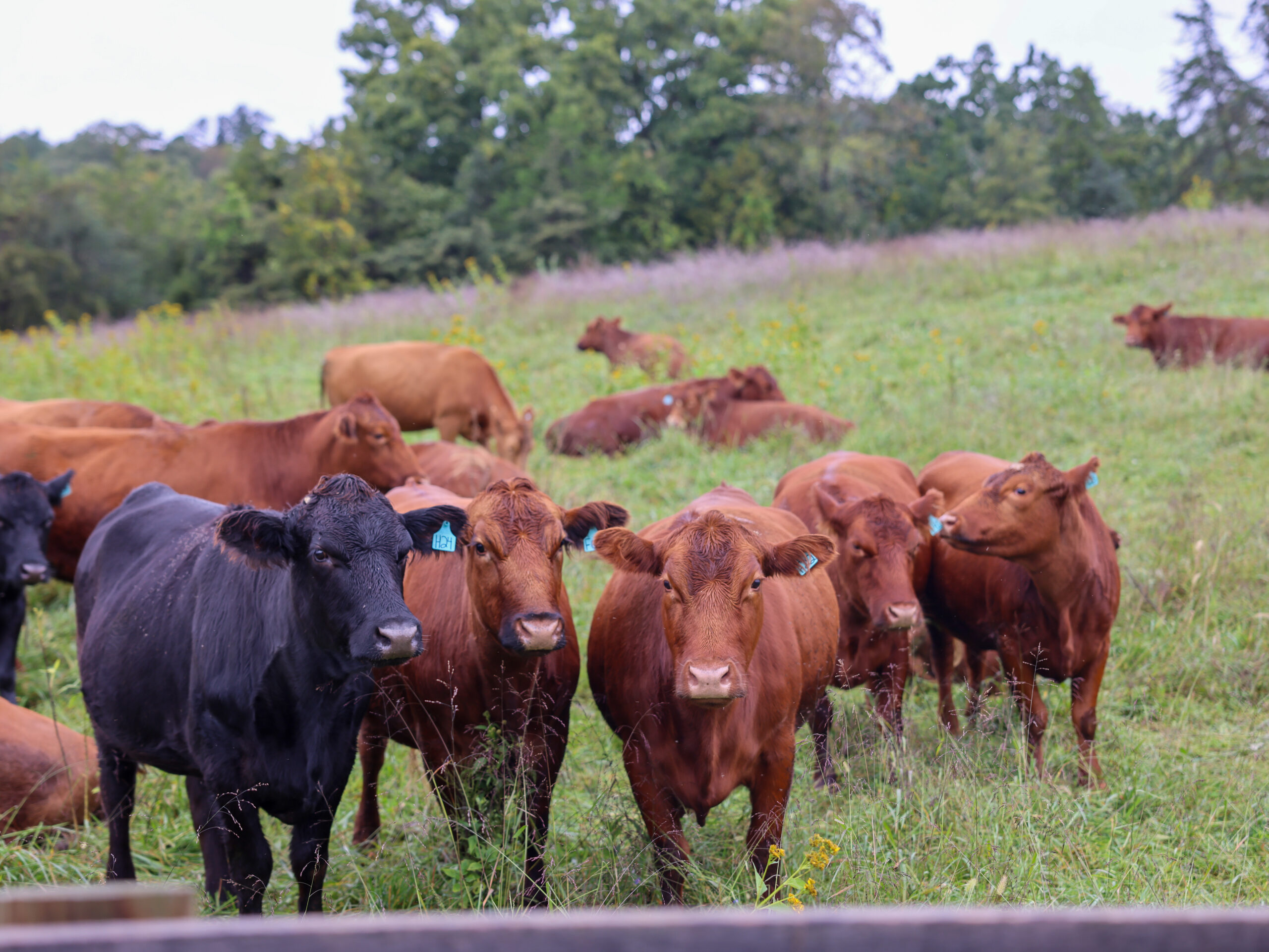
The cattle at Oakencroft complete a full circuit of the farm every two weeks. Pastures include tree cover and are not mowed in order to build soil health.
Livestock, especially cattle, have been an important, if counterintuitive, component of improving soil health at Oakencroft. While Batten allows that cattle farming at factory-farming level volumes are a big contributor to climate change, small cattle herds can be good – essential, even – for soil enrichment. The key is a small number of sheep and cows, rotated often. That way, the soil gets the benefit of being aerated and turned over by the cows’ traversal, and enriched by the manure, but no patch of land gets overly trampled or overgrazed. The cattle at Oakencroft complete a full circuit of the farm every two weeks.
Planting a wide variety of tree species also promotes biodiversity, sequesters carbon and will one day achieve one of Batten’s dreams for the farm – returning the land to its natural state of forested hills and savannah-like plains. “We’re trying to set up the structure for a forest to be there someday. It’s a whole process over 40 years.” One agroforestry technique is called silvopasture, which integrates forestry and livestock management in a mutually beneficial way. They have planted thousands of trees in the pastures where livestock graze, which creates shade for the animals so that they are less stressed and healthier in the summer, in addition to sequestering carbon.
Back to the Good Old, Women-Run Days
Most in the Charlottesville area know the Oakencroft farm primarily as a winery. Its original owner John Rogan ran it as a cattle farm, but his second wife, Felicia Warburg Rogan originated the vineyard and winemaking venture. She worked with Lucie Morton, who was the first American woman to train in viticulture at the Montpellier Institute in France, and together they became the first women-owned and run vineyard and winemaking operation in the commonwealth. Women-run wine ventures are unusual today, much less in the 1980s.
They planted vines, and Oakencroft became one of the first vineyards in Virginia. Rogan was among the first promoters of Virginia wine and played a key role in securing the Monticello American Viticultural Area (AVA) designation. Now that Batten owns the winery, she has hired biochemist Jessica Trapeni to make the wine and returned the vineyard to form in terms of women owning and running the place. “It’s come full circle,” Batten said, “which is really cool.”
With Batten at the helm, Oakencroft is again a women-run winery, but this time with a sustainability twist. 2024 was the first year they were able to refrain from using pesticides. “The whole concept of making the winery sustainable is actually going to make it better, more productive, taste better, healthier for the person who’s consuming it,” Batten said.
Leading By Example
Ultimately, Batten hopes that Oakencroft can serve as an example for other farms in sustainability-first management. A lifelong passion for architecture and design dovetailed with Batten’s goals to spread the knowledge of sustainably practices, and all of the buildings and facilities at Oakencroft reflect both. Open, airy spaces with large windows draw focus to the natural beauty of the farm in the tasting room and meeting center. Natural colors and textures in the interiors draw the outside world in.
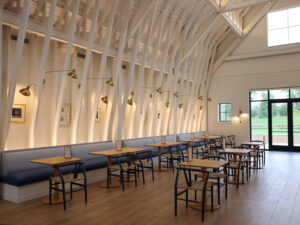
The Oakencroft Farm & Winery tasting room is characterized by open, airy spaces and focus on natural beauty.
Sustainability was front and center when remodeling the buildings on the farm. Batten’s new designs built as much as possible on the existing infrastructure. But new features that reduce waste are integrated. In addition to solar energy offsetting the buildings’ energy use, geothermal wells help regulate temperature. Rainwater collection systems and a gray water system greatly increase the efficiency of the operation’s water use. The metals on the roofs are reused, and the Accoya wood on the exteriors is a fast-growing variety that is treated through a natural process that makes it particularly resilient and long-lasting.
“We only take two bags of trash out of the tasting room each week because we compost all the food, crush all bottles on site and we don’t use any paper plastic products,” said Batten.
The Long Game
“Success for me is biodiversity,” said Batten. “It’s not about winning; it’s about creating land that’s more resilient to climate change.”
Batten’s first and foremost motive for taking ownership of Oakencroft was about loving natural beauty. “I just wanted to save this property,” she said. “I wanted to live on it because I loved it.” The intersection of business and sustainability was fresh on her mind at the time as well, having been on a mission to shift her investment strategy to sustainable ventures and looking for ways to invest proactively in the green economy and future solutions.
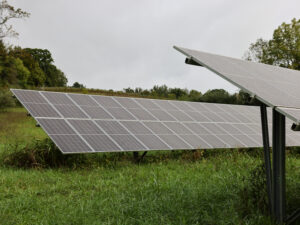
The solar arrays at Oakencroft offset the farm’s energy use.
“My interest is in climate solutions,” she said. “Everything from sustainable aviation fuel to better cement, to creating food proteins in the lab…it gives me so much hope to learn about all these people who are coming up with transformative ideas, and these things are coming to market.
The most important dividends Batten wants the farm and her approach to pay is in resilience – of plant life, animal life, and the environment as a whole, especially in the face of climate change. But she believes that human thriving will follow inevitably if the environment thrives, and business as well.
“There’s no normal trajectory, because Mother Nature is going to get worse. We just want to be doing the best that we can in this moment to ensure that this property is going to be resilient. And that’s what it’s all about,” she said. “Our business world is structured in a very short-term manner, where stockholders need returns every year. I’m looking towards long-term growth. In the end, I’m going to have something that’s way more valuable on multiple levels. Yes, the dollars, but also the biodiversity.”
The Finisher
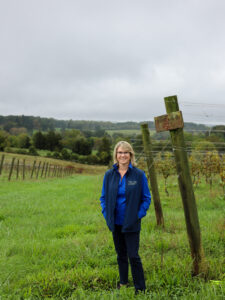
Dorothy Batten’s primary goal for Oakencroft Farm & Winery is biodiversity.
There have been and will be challenges along the way – events like the recent flooding from hurricane Helene have affected the farm and are a constant reminder of the immediate threat of climate change. But Batten’s determination is unlikely to be stifled. She has led a varied and unexpected career pathway, from initial interest in architecture, to getting an MBA at Darden, on to a counseling degree and starting an organization that works in conjunction with the video gaming industry. Not to mention work in conservation around the world. Batten’s approach to her endeavors remains constant.
“I’m a finisher,” she said. “I like to be creative and I’m not afraid of failing, but when I start things, if it’s the right thing to do, I’m going to complete it.”
It takes time to approach farming in a sustainable-forward way, but Batten is comfortable with being one of the early adopters who figure things out. She knows from experience that no learning is wasted. Though she veered off the traditional path of the typical Darden graduate in the 90’s, she says, “I don’t regret a moment of it because it was super useful learning…and it gave me a seat at the table.” She hopes that Oakencroft can be a place where like-minded people gather to share knowledge and innovative tactics.
“I feel like I have been given this gift of these resources and it’s my obligation to do something good with it,” she said.
The University of Virginia Darden School of Business prepares responsible global leaders through unparalleled transformational learning experiences. Darden’s graduate degree programs (MBA, MSBA and Ph.D.) and Executive Education & Lifelong Learning programs offered by the Darden School Foundation set the stage for a lifetime of career advancement and impact. Darden’s top-ranked faculty, renowned for teaching excellence, inspires and shapes modern business leadership worldwide through research, thought leadership and business publishing. Darden has Grounds in Charlottesville, Virginia, and the Washington, D.C., area and a global community that includes 18,000 alumni in 90 countries. Darden was established in 1955 at the University of Virginia, a top public university founded by Thomas Jefferson in 1819 in Charlottesville, Virginia.
Press Contact
Molly Mitchell
Senior Associate Director, Editorial and Media Relations
Darden School of Business
University of Virginia
MitchellM@darden.virginia.edu



